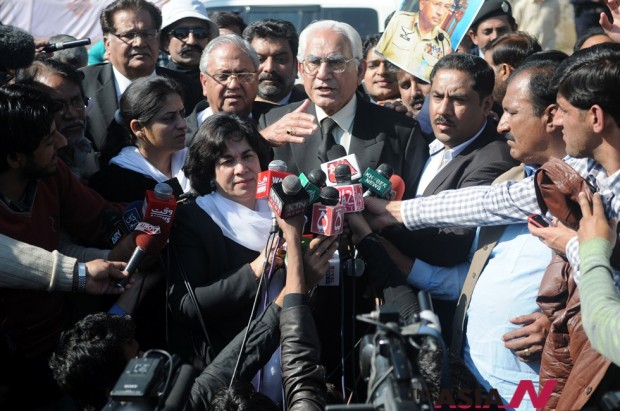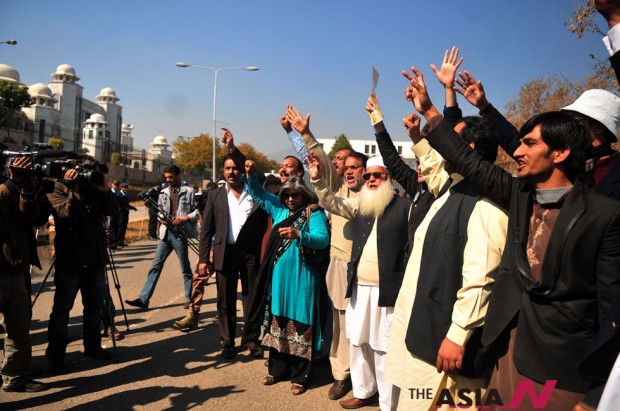Pakistan’s Musharraf appears in treason case as court defers indictment

Ahmad Raza Kasuri (C), lawyer of former Pakistani President Pervez Musharraf, speaks to the media outside a court in Islamabad, capital of Pakistan, on Feb. 18, 2014. Former Pakistani president Pervez Musharraf Tuesday appeared in a special court to face high treason charges for abrogating constitution in 2007, his lawyers said. (Xinhua/NEWSis)
Former Pakistani President Pervez Musharraf appeared Tuesday for the first time in front of a court tasked with deciding whether he committed high treason, a sharp blow for a man who was once the most powerful in Pakistan.
The appearance is also a blow to the prestige of the country’s powerful military establishment. Pakistan has undergone three military-led coups since its inception in 1947, and the institution and its leaders have often been perceived as above the law.
Musharraf missed two previous appearances in the proceedings, which began on Dec. 24, 2013, due to security scares and was hospitalized on Jan. 2 after complaining of chest pains on the way to the Islamabad courthouse. His petition to be allowed to go abroad for treatment was rejected.
His failure to appear at court sparked speculation he would use the health scare as a way to leave the country but after the brief hearing Musharraf told an Associated Press reporter that he was feeling “good.”
Up until the minute that his heavily-armed convoy left the hospital in the nearby city of Rawalpindi where he was being treated, it was not clear whether the former four-star general would appear in front of the three-judge panel.
Wearing a traditional Pakistani outfit called the shalwar kameez, Musharraf entered the courtroom while some of the lawyers chanted slogans in support and clapped. When the judges entered the room, Musharraf stood up and saluted.
But the judges failed to indict him as had been expected, saying that they would first rule on a defense motion challenging whether they had jurisdiction to hear the case in the first place before formally indicting the retired general.
The chief judge, Faysal Arab, said if the court decides it has jurisdiction, Musharraf can be called again. The defense has said that since Musharraf was the chief of army staff, this civilian court does not have the jurisdiction to hear the case.
The defense has also been alleging that the legal process is a sham designed to railroad their client. They have challenged the objectivity of the judges hearing the case as well as the way the legal panel was formed.
Speaking after the hearing, a lawyer defending Musharraf said his client’s appearance showed that he had respect for the court.
“Musharraf has appeared before the court to prove that he believes in the rule of law, and he faced the judges with the utmost humility,” said Ahmed Qasuri.

Supporters of former Pakistani President Pervez Musharraf shout slogans in Islamabad, capital of Pakistan, on Feb. 18, 2014. Former Pakistani president Pervez Musharraf Tuesday appeared in a special court to face high treason charges for abrogating constitution in 2007, his lawyers said. (Xinhua/NEWSis)
Musharraf took power in a 1999 coup and ruled the country for nearly a decade until he was forced to step down in 2008 after he became deeply unpopular. He later left the country and went into self-imposed exile. He returned to Pakistan in March 2013 to take part in nationwide elections. But he almost immediately faced a slew of legal problems relating to his time in office.
The high treason case relates to his decision in 2007 to declare a state of emergency and detain a number of judges including the country’s chief justice. The high treason case is considered the most serious of the legal cases, as well as a serious test for relations between the military and the civilian government.
Meanwhile, the Pakistani military said in a statement that an army major was killed by militants during a shootout near the frontier city of Peshawar, a development likely to further damage government efforts to negotiate a peace deal with militants in the country’s northwest.
Prime Minister Nawaz Sharif has pushed for negotiations over military action to end the years of bloodshed in the country’s northwest. But a government appointed team tasked with negotiating with the militants suspended talks Monday after an announcement by a faction of the militants that they had executed 23 soldiers.
The government negotiators met Tuesday with Sharif and told him that unless the Pakistani Taliban halts all violent actions, the committee would not be able to pursue the negotiations, according to a statement released after the meeting. Sharif thanked the committee for their efforts but has not said specifically whether he’ll stop pursuing the negotiations. (AP/NEWSis)





















































